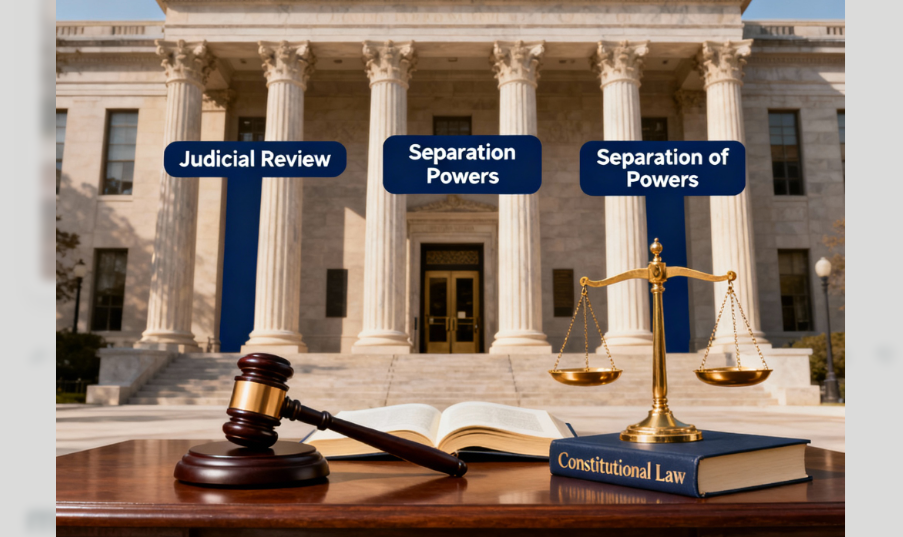Published on: 19th October 2025
Authored by: Vanishree Singh
Maharaja Agrasen Institute of Management studies, Delhi
CITATION – 1995 (5) SCC 75,
DATE OF JUDGEMENT– 03 MAY, 1995
COURT NAME – THE SUPREME COURT OF INDIA
PLAINTIFF/ APPELLANT/PETITIONER – THE RAJASTHAN STATE ROAD TRANSPORT CORPORATION & ANR.
DEFENDANT/ RESPONDENT – KRISHNA KANT ETC.
JUDGES/ BENCH – JUSTICE B.P JEEVAN REDDY, JUSTICE S.C. SEN, JUSTICE G.T NANAVATI
FACTS OF THE CASE
The Rajasthan State Road Transport Corporation (RSRTC), a state-owned public transport undertaking, employed several workmen, including Krishna Kant and other respondents. Certain disputes arose between RSRTC and its employees concerning issues such as termination from service, suspension, and denial of employment benefits. The employees claimed that the corporation’s actions were illegal, arbitrary, and in violation of service conditions and labour laws.
Instead of invoking the mechanism available under the Industrial Disputes Act, 1947 (ID Act), the employees filed civil suits before ordinary civil courts, seeking reliefs such as declarations of wrongful termination, reinstatement in service, and payment of back wages. Their argument was based on the premise that the ID Act did not explicitly bar the jurisdiction of civil courts, and therefore, they could approach the courts for enforcement of their rights.
RSRTC objected to the maintainability of these suits by asserting that the matters in question fell squarely under the definition of “industrial disputes” as provided under Section 2(k) of the ID Act, and the respondents were “workmen” as per Section 2(s).The corporation contends that once a dispute is classified as an industrial dispute, the sole and proper forum for its adjudication is the Labour Court or Industrial Tribunal, which are specifically established under the Industrial Disputes Act. RSRTC contended that entertaining such disputes in civil courts would not only contradict the intent of the legislature but also undermine the efficiency of the industrial dispute resolution mechanism. The trial courts, however, ruled in favor of the employees, holding that civil suits were maintainable since there was no express provision in the ID Act that ousted civil court jurisdiction. These decisions were affirmed by the first appellate courts. Aggrieved by these findings, RSRTC preferred an appeal to the Supreme Court, raising the important legal question of whether civil courts can adjudicate industrial disputes or whether the remedies under the ID Act are exclusive.
ISSUES OF THE CASE
- Whether civil courts have the jurisdiction to entertain disputes concerning termination, reinstatement, or service conditions of workmen when the Industrial Disputes Act, 1947, provides a specialized mechanism for adjudication?
- Whether employees classified as “workmen” under Section 2(s) of the ID Act must exclusively approach Labour Courts or Industrial Tribunals for relief rather than filing suits in civil courts?
- Whether the absence of an express bar in the ID Act allows civil courts to entertain industrial disputes, or whether the statutory scheme impliedly excludes such jurisdiction?
MAJOR ARGUMENTS
Issue 1: Jurisdiction of Civil Courts
RSRTC: The disagreements between the employees and the corporation are deemed “industrial disputes” within the meaning of Section 2(k) of the Industrial Disputes Act, 1947.
Employees: The employees argued that the ID Act does not expressly bar civil courts from hearing such cases. Under Section 9 of the CPC, civil courts have jurisdiction over all suits unless expressly excluded. Therefore, they claimed that their suits for wrongful termination and reinstatement were maintainable.
Issue 2: Alternative Remedy under the ID Act
RSRTC: The ID Act provides a complete and exclusive mechanism for resolving disputes between employers and workmen. Remedies such as reinstatement and back wages are specifically available under the Act and cannot be effectively granted by civil courts. Thus, workmen must use the industrial dispute process instead of civil litigation.
Employees: The respondents argued that raising an industrial dispute under the ID Act depends on a reference by the appropriate government under Section 10, which is discretionary and uncertain. If the government refuses to make a reference, employees would be left without a remedy, making civil suits necessary.
Issue 3: Scope of Reliefs
RSRTC: Civil courts are not equipped to deliver industrial justice and cannot handle issues like reinstatement or continuity of service. The purpose of the ID Act is to have specialized forums that understand labour issues, and civil court interference would undermine this system.
Employees: The employees maintained that civil courts can grant declaratory and injunctive reliefs under the Specific Relief Act, 1963, which may not always be available before labour forums. They argued that their claims, being partly contractual and statutory, could still be decided by civil courts.
JUDGEMENT
The Supreme Court, speaking through Justice B.P. Jeevan Reddy, delivered a landmark judgment that clarified the jurisdiction of civil courts in matters involving industrial disputes. The Court observed that the Industrial Disputes Act, 1947 (ID Act) is a special and comprehensive legislation enacted with the objective of resolving employer-employee disputes effectively and speedily through specialized tribunals like Labour Courts and Industrial Tribunals. The Act creates not only the rights and obligations of employers and workmen but also prescribes an exclusive machinery for adjudication and enforcement of these rights.
The Court held that when a dispute falls under the ambit of “industrial dispute” as defined in Section 2(k) of the ID Act, and involves “workmen” as defined under Section 2(s), the jurisdiction of civil courts is impliedly barred. This is because the ID Act is a self-contained code for industrial matters, and the remedies it provides—such as references under Section 10, awards, and enforcement mechanisms—are meant to replace the ordinary civil court process. The Court also addressed the argument that the ID Act does not expressly oust civil court jurisdiction. It clarified that a statutory bar on civil court jurisdiction can be express or implied. In the case of the ID Act, although there is no explicit bar, the scheme, structure, and purpose of the Act indicate an implied exclusion. Allowing civil suits would defeat the object of having a specialized dispute resolution system, and employees or employers would bypass labour forums to seek remedies in civil courts, causing unnecessary delays and parallel proceedings.
The Supreme Court further noted that civil courts cannot grant certain types of relief, such as reinstatement of workmen with back wages, as these remedies are specific to labour forums under the ID Act. Civil courts are primarily meant for enforcement of civil and contractual rights, whereas industrial forums deal with the wider concept of industrial justice, which is beyond the scope of ordinary courts. However, the Court carved out exceptions to this principle. It clarified that civil courts can still entertain suits in cases where: The employee is not a “workman” under Section 2(s), such as managerial or administrative staff. The dispute does not fall under the definition of an “industrial dispute.” The relief sought is based on purely contractual rights (e.g., damages for breach of contract) and is not covered by the ID Act.
After a thorough review of previous precedents, such as Premier Automobiles Ltd. v. Kamlekar Shantaram Wadke (1975) 1 SCC 496 and Dhulabhai v. State of M.P. (1968) 3 SCR 662, the Court affirmed that where a special law provides a complete framework for dispute resolution, ordinary civil courts should refrain from exercising jurisdiction. On these grounds, the Supreme Court allowed the appeal of RSRTC and dismissed the suits filed by the employees in civil courts. It emphasized that the employees should pursue their remedies under the ID Act by approaching the appropriate Labour Court or Industrial Tribunal.
RATIO DECENDI
- Exclusive Forum Principle: Where a special statute like the ID Act provides a complete mechanism for resolving disputes, the jurisdiction of civil courts is impliedly barred for those matters covered under the statute.
- Workmen Disputes: Claims relating to termination, dismissal, or conditions of service by a “workman” fall exclusively within the jurisdiction of Labour Courts or Industrial Tribunals.
- Doctrine of Alternative Remedy: The existence of an adequate alternative remedy under the ID Act prevents the invocation of civil court jurisdiction, even if the ID Act does not explicitly bar it.
- Exceptions: Civil courts may entertain cases involving non-workmen or matters unrelated to industrial disputes (e.g., contractual claims for damages not arising out of an industrial dispute)
OBITER DICTA
- Clarification on Non-Workmen Disputes: The Supreme Court observed that while the ID Act is a special mechanism for workmen, civil courts may still have jurisdiction over disputes involving non-workmen (e.g., managerial or administrative staff) or where purely contractual rights are in question. This was not essential for the final decision (as the case involved workmen), but it clarified future applicability.
- Role of Civil Courts in Absence of ID Act Remedies: The Court remarked that if a dispute is not an “industrial dispute” or if the employee does not fall under the definition of a “workman,” civil courts can step in to grant reliefs. This statement was made to distinguish the scope of civil courts from industrial forums, but it was not necessary to dispose of the case.
- On Speedy Industrial Justice: The Court also emphasized that civil courts are not suited to handle industrial justice, which is broader and requires specialized tribunals. This commentary on the inefficiency of civil courts in labour matters serves as guidance rather than a decisive reason for the outcome.
FINAL DESCISION
The Supreme Court allowed the appeal filed by RSRTC. It set aside the judgments of the lower courts, declaring that the civil suits filed by the employees were not maintainable. The Court directed that the employees must pursue their remedies under the Industrial Disputes Act, 1947, by approaching the Labour Court or Industrial Tribunal for any grievance related to termination or service conditions.
IMPACT OF THE CASE
The judgment in Rajasthan State Road Transport Corporation vs. Krishna Kant (1995) made it very clear that disputes between employers and workmen, such as issues of termination, suspension, or reinstatement, must be decided only by Labour Courts or Industrial Tribunals under the Industrial Disputes Act, 1947. The Supreme Court said that the ID Act is a special law made for industrial disputes, and because of this, civil courts cannot deal with such cases. This helped avoid confusion, delays, and conflicting decisions that often happened when both civil courts and industrial forums were approached.
The Court also explained that civil courts are not completely powerless. They can still hear cases if the employee is not a “workman” (like managerial or administrative staff) or if the dispute is not an industrial dispute. This created a clear line between what civil courts can and cannot do.The ruling strengthened the importance of using special forums meant for labour issues and ensured that disputes are solved faster and more effectively. It is still used as an important precedent whenever there is doubt about whether a civil court can handle a labour dispute.
CITATIONS & REFERENCES
Cases
1. Rajasthan State Road Transport Corporation v Krishna Kant (1995) 5 SCC 75 (SC). https://indiankanoon.org/doc/677949/
https://supremetoday.ai/doc/judgement/00100025901
2. Premier Automobiles Ltd v Kamlekar Shantaram Wadke (1975) 1 SCC 496 (SC).
https://indiankanoon.org/doc/321104/
3. Dhulabhai v State of Madhya Pradesh (1968) 3 SCR 662 (SC).
https://www.casemine.com/judgement/in/5609ab50e4b014971140c314
4. Cooper Engineering Ltd v P P Mundhe (1975) 2 SCC 661 (SC).
https://supremetoday.ai/doc/judgement/00100016682 https://indiankanoon.org/doc/926132/
Statutes
- Industrial Disputes Act 1947.
- Civil Procedure Code 1908.
- Specific Relief Act 1963.
- Constitution of India 1950.
Articles of the Constitution and Sections of Statutes
- Constitution of India 1950, arts 136, 226.
- Industrial Disputes Act 1947, ss 2(k), 2(s), 10, 11, 18, 25F, 33, 33C(2).
- Civil Procedure Code 1908, s 9.




